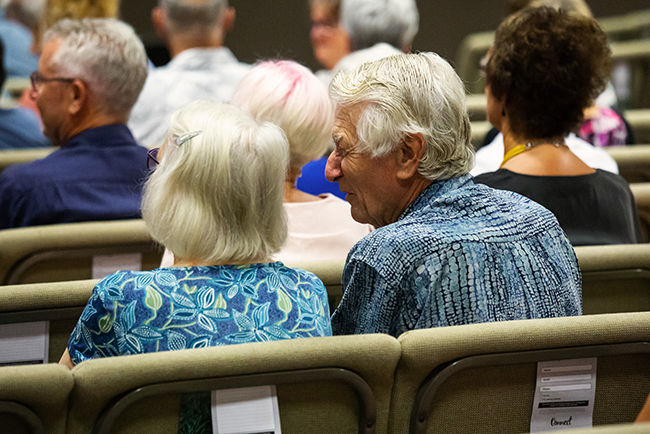
By Aaron Earls
In between colorful stained glass windows, the church pews and pulpits may look a little more gray than before. The 2020 Faith Communities Today study finds the average age of a U.S. pastor and congregation member are older than they were previously.
Older churchgoers
Since 2008, the average percentage of senior participants in congregations (65 and older) has risen 5%, according to the FACT study. While this aging trend mirrors a similar one in the U.S. population as a whole, churchgoers are twice as likely to be 65 and older. According to the U.S. Census Bureau’s 2019 American Community Survey, 17% of Americans are 65 and older. In FACT’s study, 33% of U.S. congregations are senior citizens.
Churchgoers are twice as likely as the average American to be 65 and older, according to the FACT study. Click To TweetThe other age group where congregations differ dramatically from the U.S. as a whole is 18-34 year olds. Young adults make up 23% of the population but only 14% of churches. These age group coincides with the period in which most churchgoing teenagers have dropped out of church, according to Lifeway Research.
While a quarter of religious communities are at least half senior citizens, some congregations are more likely to be lacking youth. Among mainline Protestants, 42% of churches are at least half 65 and older.
Older pastors
Not only are congregations growing older, so are their leaders. The average clergy member is 57 today compared to 50 in 2000, according to the FACT study. The seven year increase comes despite a small dip in the average age, 58 to 57 years old, in the past five years. Other studies have shown similar increases.
The average clergy member is 57 today compared to 50 in 2000, according to the FACT study. Click To TweetThe Faith Communities Today report said, “the postponement of retirement by many clergy and fewer young adults enrolling in seminaries make this general trend unlikely to reverse anytime soon.”
The trends of graying pulpits and pews appears to be related. The older the pastor, the heavier the concentration of senior citizens in their church. Pastors under 45 lead congregations where 27% are 65 and older. Senior citizen pastors, on the other hand, have churches where older adults make up 40%.
The FACT report notes that churches with older pastors and a third or more senior citizens as participants are more likely to be an older, established church. Those three age factors correlate to congregations being less likely to change, diminished spiritual vitality, less desire to look for new members, and to have not grown in the past five years.
What this means
The report is careful to note that simply having more young adults is not a “silver bullet to fix a declining congregation,” nor is it a bad thing to have older churchgoers or an older pastor. “Seniors within a congregation are absolutely essential and are often the most faithful and committed participants, dedicated volunteers, and strong financial givers as well as vessels for the community’s spiritual wisdom and history,” according to the FACT report.
Neither are older pastors automatically inferior to younger ones. In addition to likely having more experience, pastors 65 and older are more likely to have an excellent “fit with their congregation,” have less conflict, have good financial health, and are just as innovative as those younger.
The goal for congregations should not be to force out members and pastors who reach retirement age, but to leverage the strengths of those individuals and work together to reach and retain young adults. Click To TweetThe goal for congregations should not be to force out members and pastors who reach retirement age, but to leverage the strengths of those individuals and work together to reach and retain young adults.
Lifeway Research’s in-depth study of young adults who stay in church and those who drop out yielded numerous ideas that can help congregations prevent teenagers from dropping out. There are specific steps to before teenagers enter the “drop out danger zone” (ages 17 to 20). Student ministries should promote certain priorities to teenagers that will help them stick with church. And congregations should cultivate particular characteristics that encourage young adults to stay.








